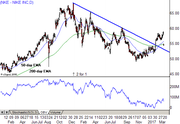Born: 1907 (San Francisco, California)
Died: 2004
Key Positions: Fisher & Company
Personal History:
Philip Fisher began his career in 1928, when he decided to drop out of Stanford Business School to take a job as a securities analyst with the Anglo-London Bank in San Francisco. Fisher went on to found his own money management firm, Fisher & Company, in 1931. He managed the company’s affairs until his retirement in 1999 at the age of 91. In nearly 70 years with Fisher & Company, Fisher became one of the formative proponents of the growth stock method of investing.
Fisher specialized in innovative and technology-focused companies founded on research and development practices. The contemporary analogy for this area would be the tech sector, although Fisher’s investment’s preceded Silicon Valley by five decades. Fisher was a proponent of long-term investing, preferring to buy excellent companies when their prices were low. In spite of his extraordinary skill as an investor, Fisher remained a highly private person and generally kept out of the public eye, although his popularity grew considerably after he published his first book in 1958.
Investment Philosophy:
In 70 years of money management, Fisher maintained a stellar record based on his belief in the strength of well-managed, high-quality growth stocks and his commitment to long-term investing. One of Fisher’s most famous investments was Motorola: he bought the stock in 1955 and didn’t sell it for the remainder of his life.
Fisher maintained a famous list of “fifteen points to look for in a common stock,” divided among two categories: qualities of management and characteristics of the business itself. Fisher recommended looking for management with integrity, conservative accounting, accessibility, and good long-term outlook, as well as openness to change, excellent financial controls, and good personnel policies.
Fisher recommended targeting business for investment that had growth orientation, high profit margins, high return on capital, a commitment to research and development, superior sales organization, leading industry position and proprietary products or services.
Fisher was famous for the depth of his research on companies with which he would invest. He relied on personal connections (what he called the “business grapevine”) and conversation to learn about businesses before buying stock. His first and most important book, “Common Stocks and Uncommon Profits” of 1958, devotes careful attention to this concept of networking and gathering information via business contacts.
Noteworthy Publications:
- "Common Stocks and Uncommon Profits" by Phillip A. Fisher (1958)
- "Conservative Investors Sleep Well" by Phillip A. Fisher (1975)
- "Developing An Investment Philosophy" by Philip A. Fisher (1980)
Quotes
"I don't want a lot of good investments; I want a few outstanding ones."
"I remember my sense of shock some half-dozen years ago when I read a [stock] recommendation to sell shares of a company . . . The recommendation was not based on any long-term fundamentals. Rather, it was that over the next six months the funds could be employed more profitably elsewhere."
"I sought out Phil Fisher after reading his "Common Stocks and Uncommon Profits". When I met him, I was impressed by the man and his ideas. A thorough understanding of a business, by using Phil's techniques … enables one to make intelligent investment commitments." (Warren Buffett)
"Among the pioneer, formative thinkers in the growth stock school of investing, he may have been the last professional witnessing the 1929 crash to go on to become a big name. His career spanned 74 years, but was more diverse than growth stock picking. He did early venture capital and private equity, advised chief executives, wrote and taught. He had an impact. For decades, big names in investing claimed Dad as a mentor, role model and inspiration." (Kenneth L. Fisher, Philip Fisher’s son)
The Greatest Investors: Benjamin Graham
-
 Small Business
Small BusinessHow Ken Fisher Made It and His Advice for Investors
Learn about the rise of Kenneth Fisher, the would-be forester who became the founder of one of the largest money management firms in the country. -
 Trading
TradingSpotting Breakouts As Easy As ACD
Wondering what it means to be a "logical trader"? Take a look at this system devised by Mark Fisher. -
 Financial Advisor
Financial AdvisorThe One Thing Your Portfolio Must Always Have
Portfolio diversification is essential in any situation, but especially so as the market finally returns to fundamentals. -
 Trading
TradingNike Bottom Fishers Ready to Reload Positions
Nike has dropped nearly 6% after weak earnings, but positive long-term cycles should limit damage and draw in fresh buying interest. (NKE, UAA) -
 Insights
InsightsAdam Peakes In as Noble Corp. CFO (NE)
Noble Corp. named Adam Peakes executive vice president and CFO, replacing Kenneth Fisher early next year. -
 Investing
InvestingStrategies of Legendary Value Investor
In this article, we'll look at some value investing techniques that legendary investors like Warren Buffett have used to identify undervalued companies. -
 Small Business
Small Business5 Companies That Changed Their Core Products
As times and technologies change, companies must adapt to fit the marketplace. These five companies are perfect examples of that theory. -
 Investing
InvestingWarren Buffett's Paycheck
How much money does the Oracle of Omaha really have?



